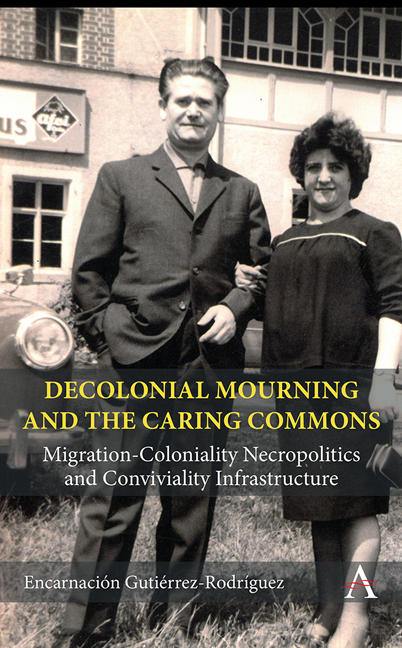 Decolonial Mourning and the Caring Commons
Decolonial Mourning and the Caring Commons Book contents
- Frontmatter
- Contents
- Acknowledgments
- 1 Introduction: Entangled Mournings
- 2 Trauerarbeit: Decolonial Mourning
- 3 Political Mourning
- 4 Countering Necropolitical Social Reprodution
- 5 Accountable Mourning: Bearing Witness
- 6 Communal Mourning: Becoming-With
- 7 Mourning’s Justice: Conviviality Infrastructure of a Caring Commons
- Notes on Author
- References
- Index
4 - Countering Necropolitical Social Reprodution
Published online by Cambridge University Press: 29 February 2024
- Frontmatter
- Contents
- Acknowledgments
- 1 Introduction: Entangled Mournings
- 2 Trauerarbeit: Decolonial Mourning
- 3 Political Mourning
- 4 Countering Necropolitical Social Reprodution
- 5 Accountable Mourning: Bearing Witness
- 6 Communal Mourning: Becoming-With
- 7 Mourning’s Justice: Conviviality Infrastructure of a Caring Commons
- Notes on Author
- References
- Index
Summary
Introduction
#NoEstamosTodas
Paramos porque nos faltan las víctimas de femicidio, voces que se apagan violentamente al ritmo escalofriante de una por día sólo en la Argentina.
Nos faltan las lesbianas y travestis asesinadas.
Nos faltan las presas políticas, las perseguidas, las asesinadas en nuestro territorio latinoamericano por defender la tierra y sus recursos.
Nos faltan las mujeres encarceladas por delitos menores que criminalizan formas de supervivencia, mientras los crímenes de las corporaciones y el narcotráfico quedan impunes porque benefician al capital.
Nos faltan las muertas y las presas por abortos inseguros.
Nos faltan las desaparecidas por las redes de trata; las víctimas de la explotación sexual.
Frente a los hogares que se convierten en infiernos, nos organizamos para defendernos y cuidarnos entre nosotras.
Frente al crimen machista y su pedagogía de la crueldad, frente al intento de los medios de comunicación de victimizarnos y aterrorizarnos, hacemos del duelo individual consuelo colectivo, y de la rabia lucha compartida. Frente a la crueldad, más feminismo.
(Ni Una Menos 2017).On International Women's Day, 8 March 2017, the Argentinean feminist movement #NiUnaMenos presented their manifest #NosotrasParamos—#WeStrike. In it they state:
Este 8 de marzo la tierra tiembla. Las mujeres del mundo nos unimos y organizamos una medida de fuerza y un grito común: Paro Internacional de Mujeres. Nosotras Paramos. Hacemos huelga, nos organizamos y nos encontramos entre nosotras. Ponemos en práctica el mundo en el que queremos vivir.
The feminist mobilization against feminicide represented “un grito común” (a united outcry)—while also mourning the members it has lost to feminicide and violence against LGBTIQA+. It is this act of mourning that articulated the affective labor involved in the political manifestation against violence, voiced by the feminist strike of #NiUnaMenos. Women of all occupations went on strike for one hour in Argentina, initiating a social movement that went viral. The manifesto of #NiUnaMenos #NosotrasParamos—#WeStrike was written and signed by several political organizations, from grassroots groups to trade unions. It offers an analysis of violence against women as a specific articulation of contemporary neoliberal capitalism in Latin America and the women's strike as its political counterforce. This movement manifests a new potentiality of the political and resistance to structural cruelty (Gago 2020).
- Type
- Chapter
- Information
- Decolonial Mourning and the Caring CommonsMigration-Coloniality Necropolitics and Conviviality Infrastructure, pp. 83 - 110Publisher: Anthem PressPrint publication year: 2023
